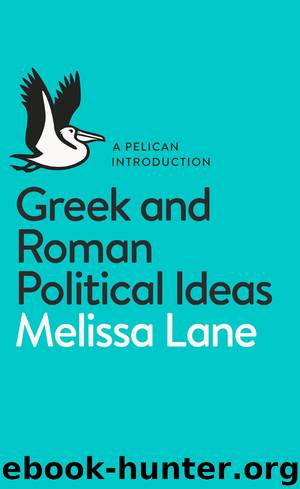Greek and Roman Political Ideas by Melissa Lane

Author:Melissa Lane
Language: eng
Format: epub
ISBN: 9780141976167
Publisher: Penguin Books Ltd
Published: 2014-04-09T16:00:00+00:00
Contesting Equality
Equality is the essence of politics properly understood. As Aristotle says: ‘constitutional rule is of those who are free and equal’ (1255b). Conceptually, there should be no rule (no relation of subordination) among equals, because there is no logical basis to subordinate one equal to another. But, since rule is necessary in practice – a vital concession by Aristotle to experience – free and equal citizens take it in turns. Hence Aristotle’s famous account of the good citizen as one who knows how to rule and be ruled, though his definition proper of the citizen has come earlier: ‘he who shares in judging and in office’ (1277a, 1275a). Yet this definition does not automatically imply democracy (nor does it imply that all citizens must be eligible to hold all offices); nor does it deny the possibility of monarchy, since citizens may share in some functions of government even under a monarch. To have a share – to be equal in having a share – is not necessarily to have an exactly equal share. It leaves room for those functions, and for others, to be shared unequally on the basis of other relevant characteristics.
The fundamental question of ‘who is an equal’ is for Aristotle a question that has to be parsed logically into different possible meanings of ‘equal’. To give equality meaning, one modern scholar notes that we must always ask, ‘Equality of what?’8 Aristotle had already taught that ‘equality of what’ is always also tantamount to ‘equality for whom’. Depending on what counts as the basis for equality, some people will be included into citizenship or excluded from it.
In the ongoing conflicts between oligarchies and democracies, together with the spectre of oligarchy sharpened into monarchical empire, Aristotle acknowledges two fundamentally different ideas of equality at work. One of them is ‘arithmetical equality’: each person simply counts for one, as in majoritarian voting – which is more friendly to democracy. The other is ‘geometrical equality’: only those people are equal who are of equal merit or worth – whether that be measured in terms of virtue or more prosaically in terms of wealth – a definition more friendly to oligarchy. That is, these two logically open interpretations of equality give rise to two opposed political positions. In reality, democracies and oligarchies can both count as forms of constitutional rule. For they are each premised on equality, even though they identify ‘equals’ on different grounds. But each side will view the other’s interpretation as flawed: democrats viewing themselves as ‘being equal, claim to be worthy of sharing equally in all things’, while oligarchs, viewing themselves as ‘being unequal [to the many], seek to get more for themselves’ (1301a).
The violent tussles between partisans of oligarchy and democracy that marked the Greek world in the 5th and 4th centuries BCE were real-life illustrations of Aristotle’s point: that treating politics as a matter for equal citizens does not yet settle which citizens are to be considered equal. (The same is true of the struggles for the franchise for workers, one-time slaves and women in modern times.
Download
This site does not store any files on its server. We only index and link to content provided by other sites. Please contact the content providers to delete copyright contents if any and email us, we'll remove relevant links or contents immediately.
The Secret History by Donna Tartt(16681)
The Social Justice Warrior Handbook by Lisa De Pasquale(11496)
Thirteen Reasons Why by Jay Asher(7810)
This Is How You Lose Her by Junot Diaz(5805)
Weapons of Math Destruction by Cathy O'Neil(5058)
Zero to One by Peter Thiel(4841)
The Myth of the Strong Leader by Archie Brown(4797)
Promise Me, Dad by Joe Biden(4462)
Beartown by Fredrik Backman(4447)
How Democracies Die by Steven Levitsky & Daniel Ziblatt(4430)
Stone's Rules by Roger Stone(4427)
The Fire Next Time by James Baldwin(4357)
100 Deadly Skills by Clint Emerson(4095)
A Higher Loyalty: Truth, Lies, and Leadership by James Comey(4045)
Rise and Kill First by Ronen Bergman(4029)
The David Icke Guide to the Global Conspiracy (and how to end it) by David Icke(3900)
The Farm by Tom Rob Smith(3884)
Secrecy World by Jake Bernstein(3793)
The Doomsday Machine by Daniel Ellsberg(3743)
